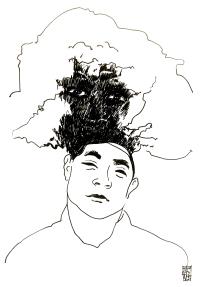‘Piercing the White Space’ is an attempt to collect some great poetry about what whiteness means together in one place. The theme was open to interpretation, so a writer might have written about that space that we find each day as we bring ourselves to the page, the space we leave between stanzas, or the breath between words. Many writers wrote about culture, about how it feels to write into a designated space. As ‘ethnic’ writers, spaces are prepared for us in writing culture in Aotearoa. Inherent in this preparation is a form of control: we are displayed as colourful ‘others’. But whiteness contains liminality; it contains a rainbow of colours. By writing into the white space, by consciously piercing it, we might truly voice ourselves.
I’m so excited to present such a wide range of voices here. Airini Beautrais writes about how Pākehā have overlooked the Māori relationship with the Whanganui river, and Selina Tusitala Marsh writes about ‘dos and don’ts when visiting whiteland’. Doug Poole’s excellent prose poem ‘Footsteps’ is half-music, half-ululation. We have some long-awaited new poetry from Nick Ashcroft, and work by Renee Liang, who took time out from touring a play about a giant crayfish to record some amazing audio for us. International poets Yuan Changming, Manisha Anjali, and Karin Speedy tackle language, beauty conventions, and colonisation. Closer to home, Wai Ho writes about Pākehā nipples, Wes Lee writes about waiting spaces, and Tru Paraha brings us some great experimental verse, as well as some work in te reo. Our cover artist is Rosie Whinray, whose evocative image ‘The Island’ is such a fitting illustration for this issue.
The impetus for ‘Piercing the White Space’ came out of my personal experiences. I’ve always wanted to be a writer, but it wasn’t until I began to share my work that I realised I might be labeled as a specific kind of writer if I published a book: an ‘ethnic’ writer. I realised this because of what others had to say about the cultural importance of my work. While such responses were flattering, they also made me feel uncomfortable. Why? In an interview with Selina Tusitala Marsh, Karlo Mila speaks of her discomfort with possibly being seen to represent Tongans as a group:
Marsh: ‘Do you see this collection as … being the speaking voice for a particular generation of Pacific Islanders in New Zealand?’
Mila: ‘I’m always a bit nervous about being considered in any way a kind of “authentic Pacific voice,” or “Tongan woman” or “young woman”, because I’m really clear that my identity is quite complicated. I’ve had quite an unorthodox upbringing, and I’m half, and it’s just not that straightforward, and I would think that probably it would be doing a disservice to the Tongan community should some Palagi person read this and think ‘Oh, this is the Tongan experience,’ because it’s far from it: it’s my experience, and although it’s one voice, it’s certainly not the voice.’
As ‘ethnic’ writers we write for our communities, but we are also seen to be representing our communities. Nam Lee, author of The Boat, has this to say in response to a question about ‘ethnic’ literature’:
Interviewer: ‘You seem to be turning the idea of "ethnic literature" (i.e. that because you are Vietnamese you are somehow obligated to write about the Vietnamese experience) on its head while also playing with the idea of fiction vs. autobiography. Can you talk a little about that?’
Lee: ‘What is ethnic literature? Is it determined by the author or the text? Does autobiography matter? If so, why? How much? Does the intended audience matter? Is it at all defined by marketing, or positioning? How does it exist in relation to commercial fiction? To literary fiction? Does it exist as a subset or superset of these categories? Or as something entirely separate? ... I’m not exactly sure how to go at these questions — I struggle with them on both sides of the sharpened stick — but I do know that there’s a reticence in general discourse about ‘ethnic literature’ and I wanted in this story to go some way towards starting a conversation.’
In piercing the white space we do what we have the power to do as writers: complicate binaries, overturn expectations, and, most importantly, begin a conversation. The poets featured here all have complex identities or subject matter. I think their work contributes to an international conversation, one which in this present moment of violently policed cultural and actual borders, we need to be having.
Enjoy!
Michalia Arathimos
Biography Michalia Arathimos
Michalia Arathimos is Greek-New Zealand writer currently resident in Melbourne. She has published work in Best New Zealand Fiction Volume 4, Lost in Translation: New Zealand Short Stories, Sport, JAAM, Turbine, Metro, The NZ Listener and Blackmail Press. She holds a PhD in Creative Writing from the IIML, and was a Robert Lord Fellow in 2008. She is a Fiction Reviewer for Overland. Her debut novel, Aukati – Boundary Line, will be published in 2016 by Mākaro Press.

